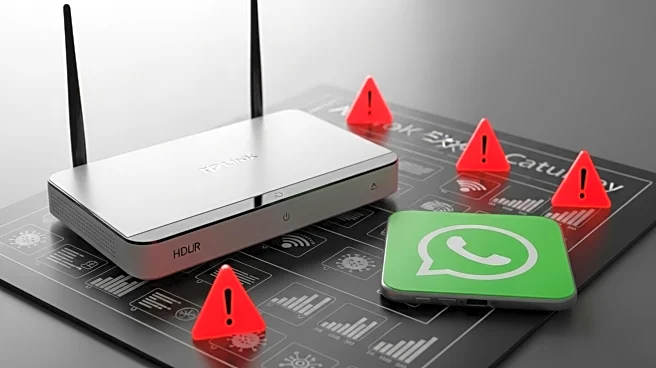What is the story about?
What's Happening?
The U.S. Cybersecurity and Infrastructure Security Agency (CISA) has added two significant vulnerabilities to its Known Exploited Vulnerabilities (KEV) catalog. The first is a high-severity flaw in TP-Link TL-WA855RE Wi-Fi Ranger Extender products, identified as CVE-2020-24363, which allows unauthenticated attackers on the same network to perform a factory reset and gain elevated access. This vulnerability has been fixed in a firmware update, but the product is now end-of-life, meaning no further updates will be provided. Users are advised to replace their devices for better security. The second vulnerability involves WhatsApp, CVE-2025-55177, which has been exploited in a targeted spyware campaign. This flaw was used in conjunction with an Apple iOS, iPadOS, and macOS vulnerability, CVE-2025-43300. WhatsApp has notified fewer than 200 users who may have been targeted. Federal Civilian Executive Branch agencies are urged to apply necessary mitigations by September 23, 2025.
Why It's Important?
These vulnerabilities highlight ongoing cybersecurity challenges, particularly in consumer technology and communication platforms. The TP-Link flaw underscores the risks associated with outdated hardware, emphasizing the need for regular updates and replacements to maintain security. The WhatsApp vulnerability, linked to a spyware campaign, raises concerns about privacy and the security of personal communications. It demonstrates the sophistication of cyber threats and the importance of timely notifications and mitigations to protect users. The inclusion of these vulnerabilities in the KEV catalog signals their potential impact on national security and the need for vigilance among federal agencies and consumers alike.
What's Next?
Federal agencies are expected to implement mitigations by the specified deadline to counter these vulnerabilities. Consumers using affected TP-Link devices should consider upgrading to newer models to ensure continued protection. The cybersecurity community will likely continue monitoring these vulnerabilities for further exploitation attempts. Additionally, WhatsApp and other tech companies may enhance their security measures and user notification systems to better address such threats in the future.














